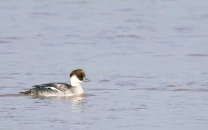Provinces approve draft of biodiversity action plan
Revised draft highlights over 20 targets

Revised draft highlights over 20 targets.
The revised draft of the plan that highlights over 20 targets was launched at a workshop, organised by the Ministry of Climate Change (MOCC) and the International Union for Conservation of Nature (IUCN), at a local hotel, here on Thursday.
Ecological help: Biodiversity plan launched for second time in 15 years
Sustainable use of biodiversity is not only a national need but also a global obligation under the Convention on Biological Diversity (CBD).
A biodiversity action plan (BAP) was prepared back in 2000 but its implementation remained slow due to a weak institutional framework. In 2010, in a global review it was revealed that biodiversity in the country was continuing to be lost and ecosystems were degrading and undermining human wellbeing.
In October 2010, a conference held in Japan adopted a strategic plan for biodiversity 2011-2020 with 20 targets.
“In Pakistan, the process of revision was started with the Global Environmental Fund (GEF) grant for enabling activities in 2014 and the fifth national report was prepared along with initial consultations with the stakeholders,” Ministry of Climate Change Biodiversity Programme Director Naeem Ashraf Raja said.
Biodiversity: ‘Renewable energy use can reduce exposure to leopards’
He said that the country was unable to implement the first biodiversity action plan completely mainly because of lack of clear mechanism for coordination between the provinces and the federation.
Raja said there was a need to align BAP with strategic plan of CBD 2001-2020 and its Aichi Biodiversity targets.
He said that the biodiversity working group (BWG) was processed and first round of consultation was held in March 2015, and a draft prepared and shared with stakeholders and incorporated their suggestions. Raja said a second round of consultation was held in Azad Kashmir, Gilgit-Baltistan (G-B), Balochistan, Sindh, Punjab and Khyber-Pakhtunkhwa.
“There is no reliable mapping, assessment of ecosystem, habitats and species, no valuation studies in respect of benefit of ecosystem that exist in Pakistan,” the IUCN Pakistan Biodiversity Consultant, Javed Ahmed said.
Preserving biodiversity: Pakistan likely to ratify Nagoya protocol soon
He added that biodiversity was on low priority in planning and resources allocations besides legal and policy framework.
Ahmed said that institutional capacity was weak.
“We need a national level guideline to protect biodiversity,” Ahmed stressed.
“It is our national duty to preserve what we have, the MOCC and the IUCN are trying to preserve biodiversity,” the MOCC Secretary, Arif Ahmed Khan said and added that if out of 20 half of targets were achieved than too it would be a big achievement.
The AJK Biodiversity Director, Dr Aurangzeb said that biodiversity strategy was a working document.
“We need an act or policy to save nature in AJK,” he said.
Balochistan Director Biodiversity Syed Ali Imran asked the federal government to provide funds for conservation of natural resources of the province.
The G-B Forest Conservator, Walayat Noor said that nine out of 10 districts in the region had protected forests, and expressed intention to sign an MoU with the forest department and the MOCC to increase cooperation.
The K-P Biodiversity Director, Shandana Azizullah, extended support to support to national policy on biodiversity.
“We are victims of not only natural calamities but also manmade calamity,” she said, and added that K-P government had allocated Rs42 billion for the local government and was taking steps to overcome trust deficit.
The Punjab Planning and Development Department Director, Dr Ahmed Bilal said that the NBSAP document should be monitored on a regular basis.
Sindh Biodiversity Director Abdul Jabbar Qazi said that for implementation on the NBSAP there should be dedicated offices in provinces for biodiversity.
Published in The Express Tribune, November 6th, 2015.



















COMMENTS
Comments are moderated and generally will be posted if they are on-topic and not abusive.
For more information, please see our Comments FAQ